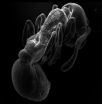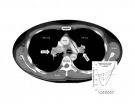(Press-News.org) More than a third of patients who suffer a major bleeding in the brain and have their life support withdrawn might have eventually regained an acceptable level of functioning if life support had been sustained, suggests a new study presented at the American Stroke Association's International Stroke Conference 2013.
In the United States, 10 percent of the estimated 795,000 strokes each year are intracerebral hemorrhages (ICH). ICH is the most common type of bleeding stroke and it occurs when a weakened blood vessel inside the brain ruptures and leaks blood into surrounding brain tissue, causing neurological damage.
The new study, initially encompassing 590 patients at a Seattle hospital, was designed to see whether "self-fulfilling prognostic pessimism," might play a part in life-support decisions, said David Tirschwell, M.D., M.Sc., lead author and co-director of the University of Washington Stroke Center at Harborview, in Seattle.
Researchers identified 78 patients whose life support was withdrawn and compared their outcomes with 78 similar patients who were not removed from life support.
Researchers chose a disability rating of "moderately severe" or better as an "acceptable outcome." Moderately severe could mean patients are unable to attend to their own bodily needs or be unable to walk without assistance, Tirschwell said. He also acknowledged that "acceptable outcome" is up to each individual's perception and preferences.
At hospital discharge, only 4 percent of matched patients whose life support was withdrawn had an acceptable outcome, compared with 38 percent of the matches who did not have life support withdrawn — suggesting 34 percent of the group whose support was withdrawn might also have had an acceptable outcome if support had been sustained.
"Greater patience and less pessimism may be called for in making these life-and-death decisions," he said.
For their analysis, the researchers created a "propensity score" indicating the probability that a decision to withdraw life support would be made for a given ICH patient. The propensity score was based on a number of factors: age; functional status before the ICH; level of consciousness; how much bleeding occurred; pre-existing hypertension; diabetes; atrial fibrillation; first temperature measurement on the patient; and whether the patient was intubated for breathing support.
The strongest predictors of life support withdrawal — and the factors most crucial in the patient matching — were measures of the hemorrhage's severity, Tirschwell said.
"These results are yet another piece of evidence suggesting healthcare providers may be overly pessimistic in their assessments of these patients' prognoses, leading families to choose withdrawal of life support before the patient has had a chance to recover from their stroke," Tirschwell said.
Most decisions to withdraw life support are made by next of kin, in consultation with other relatives and with doctors, in the first few days of hospitalization after the ICH, he said. In that time frame, "it would be unrealistic to think the patient has had a chance to attain any measure of recovery," he said.
While "moderately severe" disability represents far-from-ideal capabilities, "the time of hospital discharge is likely only a couple of weeks after the ICH and recovery is a months-long process, and some of these patients — many even — might recover further," he said.
Tirschwell said the conclusions are based on the assumption of further recovery, which is known to be a long process and notoriously difficult to predict and the fact that quality of life is subjective. The study, conducted in one hospital, might not reflect practices at other institutions, Tirschwell said.
"The study does a commendable job measuring the effect on patient outcome of the decision-making process, probably the single most difficult factor to model," said Steven Greenberg, M.D., Ph.D., chair of the International Stroke Conference, Harvard Medical School neurology professor and director Hemorrhagic Stroke Research at Massachusetts General Hospital in Boston.
"The finding that fully a third of ICH patients in whom life support is withdrawn might otherwise survive is staggering" Greenberg said. "The major challenges in interpreting this finding are to determine whether patients can make further improvements after discharge, and if not, whether needing someone to help with walking, washing and other needs is an acceptable quality of life for them."
###
Co-authors are Kyra J. Becker, M.D.; Claire J. Creutzfeldt, M.D.; Marisa Gallo, B.S.; and W.T. Longstreth Jr., M.D., M.P.H. Author disclosures are on the abstract.
Funding from the healthcare company Novo Nordisk supported the database used in the research.
Follow news from the ASA International Stroke Conference 2013 via Twitter @HeartNews; #ISC13.
Statements and conclusions of study authors that are presented at American Stroke Association scientific meetings are solely those of the study authors and do not necessarily reflect association policy or position. The association makes no representation or warranty as to their accuracy or reliability. The association receives funding primarily from individuals; foundations and corporations (including pharmaceutical, device manufacturers and other companies) also make donations and fund specific association programs and events. The association has strict policies to prevent these relationships from influencing the science content. Revenues from pharmaceutical and device corporations are available at www.heart.org/corporatefunding.
Note: Actual presentation is 4:35 p.m. HT/9:35 p.m. ET, Thursday, Feb. 7, 2013.
Some stroke patients whose life support is withdrawn may have achieved a less-than-ideal
Abstract: TMP83
2013-02-07
ELSE PRESS RELEASES FROM THIS DATE:
Magnetic map guides salmon home
2013-02-07
For sockeye salmon coming home after years spent at sea, a magnetic map is apparently responsible for their remarkable sense of direction. That's according to an analysis of data collected over 56 years and reported online on February 7 in Current Biology, a Cell Press publication.
"To find their way back home across thousands of kilometers of ocean, salmon imprint on the magnetic field that exists where they first enter the sea as juveniles," said Nathan Putman of Oregon State University. "Upon reaching maturity, they seek the coastal location with the same magnetic ...
For ant pupae, status means being heard
2013-02-07
AUDIO:
This is a recording of ant pupa sound.
Click here for more information.
For young ants at the pupal stage of life—caught between larva and adulthood—status is all about being heard. The findings, reported online on February 7 in Current Biology, a Cell Press publication, add to evidence that ants can communicate abstract information through sound in addition to chemical cues.
"One of the truly fascinating characteristics of social insects is their power of self-organization, ...
Researchers identify potential target for age-related cognitive decline
2013-02-07
As the elderly age, their ability to concentrate, reason, and recall facts tends to decline in part because their brains generate fewer new neurons than they did when they were younger. Now, researchers reporting in the February 7th issue of the Cell Press journal Cell Stem Cell have discovered a molecule that accumulates with age and inhibits the formation of new neurons. The finding might help scientists design therapies to prevent age-related cognitive decline.
The investigators identified the molecule, called Dickkopf-1 or Dkk1, in the brains of aged mice. By blocking ...
Reassuring evidence: Anticancer drug does not accelerate tumor growth after treatment ends
2013-02-07
Studies in animals have raised concerns that tumors may grow faster after the anticancer drug sunitinib is discontinued. But oncologists and physicists who collaborated to analyze data from the largest study of patients with kidney cancer convincingly demonstrate that such tumor acceleration does not occur in humans. The findings, publishing online on February 7th in the Cell Press journal Cell Reports, suggest that sunitinib does not cause lingering risks for patients after their treatment ends.
"We were able to demonstrate that this applied across all patients and that ...
Hopkins researchers uncover key to antidepressant response
2013-02-07
Through a series of investigations in mice and humans, Johns Hopkins researchers have identified a protein that appears to be the target of both antidepressant drugs and electroconvulsive therapy. Results of their experiments explain how these therapies likely work to relieve depression by stimulating stem cells in the brain to grow and mature. In addition, the researchers say, these experiments raise the possibility of predicting individual people's response to depression therapy, and fine-tuning treatment accordingly. Reports on separate aspects of the research were published ...
Treatment with clot-busting drug yields better results after stroke than supportive therapy alone
2013-02-07
In an update to previous research, Johns Hopkins neurologists say minimally invasive delivery of the drug tPA directly into potentially lethal blood clots in the brain helped more patients function independently a year after suffering an intracerebral hemorrhage (ICH), a deadly and debilitating form of stroke. Rates of functional recovery with the active tPA treatment far surpassed those achieved with standard "supportive" therapy that essentially gives clots a chance to shrink on their own.
In the current Johns Hopkins-led study, ICH patients who randomly received the ...
Clot-retrieval devices failed to improve stroke-related disability
2013-02-07
A stroke survivor's chances of living independently after 90 days are not improved by the use of devices inserted into the artery to dissolve or remove a stroke-causing clot shortly after the onset of symptoms, according to a randomized controlled trial involving 656 patients.
The study, funded by the National Institute of Neurological Disorders and Stroke (NINDS), part of the National Institutes of Health, compared the intra-arterial device-based approach plus the current standard of intravenous (IV) tissue plasminogen activator (t-PA), a clot-busting drug with IV t-PA ...
In the brain, broken down 'motors' cause anxiety
2013-02-07
VIDEO:
This video (S3 in the paper) shows the transport defect of the serotonin receptor in a KIF13A knock out neuron compared with a wild type neuron.
Click here for more information.
When motors break down, getting where you want to go becomes a struggle. Problems arise in much the same way for critical brain receptors when the molecular motors they depend on fail to operate. Now, researchers reporting in Cell Reports, a Cell Press publication, on February 7, have shown ...
Salmon may use magnetic field as a navigational aid
2013-02-07
CORVALLIS, Ore. – The mystery of how salmon navigate across thousands of miles of open ocean to locate their river of origin before journeying upstream to spawn has intrigued biologists for decades, and now a new study may offer a clue to the fishes' homing strategy.
In the study, scientists examined 56 years of fisheries data documenting the return of sockeye salmon to the Fraser River in British Columbia – and the route they chose around Vancouver Island showed a correlation with changes in the intensity of the geomagnetic field.
Results of the study, which was supported ...
Immune systems of healthy adults 'remember' germs to which they've never been exposed
2013-02-07
STANFORD, Calif. — It's established dogma that the immune system develops a "memory" of a microbial pathogen, with a correspondingly enhanced readiness to combat that microbe, only upon exposure to it — or to its components though a vaccine. But a discovery by Stanford University School of Medicine researchers casts doubt on that dogma.
In a path-breaking study to be published online Feb. 7 in Immunity, the investigators found that over the course of our lives, CD4 cells — key players circulating in blood and lymph whose ability to kick-start the immune response to viral, ...
LAST 30 PRESS RELEASES:
6 in 10 US women projected to have at least one type of cardiovascular disease by 2050
People’s gut bacteria worse in areas with higher social deprivation
Unique analysis shows air-con heat relief significantly worsens climate change
Keto diet may restore exercise benefits in people with high blood sugar
Manchester researchers challenge misleading language around plastic waste solutions
Vessel traffic alters behavior, stress and population trends of marine megafauna
Your car’s tire sensors could be used to track you
Research confirms that ocean warming causes an annual decline in fish biomass of up to 19.8%
Local water supply crucial to success of hydrogen initiative in Europe
New blood test score detects hidden alcohol-related liver disease
High risk of readmission and death among heart failure patients
Code for Earth launches 2026 climate and weather data challenges
Three women named Britain’s Brightest Young Scientists, each winning ‘unrestricted’ £100,000 Blavatnik Awards prize
Have abortion-related laws affected broader access to maternal health care?
Do muscles remember being weak?
Do certain circulating small non-coding RNAs affect longevity?
How well are international guidelines followed for certain medications for high-risk pregnancies?
New blood test signals who is most likely to live longer, study finds
Global gaps in use of two life-saving antenatal treatments for premature babies, reveals worldwide analysis
Bug beats: caterpillars use complex rhythms to communicate with ants
High-risk patients account for 80% of post-surgery deaths
Celebrity dolphin of Venice doesn’t need special protection – except from humans
Tulane study reveals key differences in long-term brain effects of COVID-19 and flu
The long standing commercialization challenge of lithium batteries, often called the dream battery, has been solved.
New method to remove toxic PFAS chemicals from water
The nanozymes hypothesis of the origin of life (on Earth) proposed
Microalgae-derived biochar enables fast, low-cost detection of hydrogen peroxide
Researchers highlight promise of biochar composites for sustainable 3D printing
Machine learning helps design low-cost biochar to fight phosphorus pollution in lakes
Urine tests confirm alcohol consumption in wild African chimpanzees
[Press-News.org] Some stroke patients whose life support is withdrawn may have achieved a less-than-idealAbstract: TMP83



